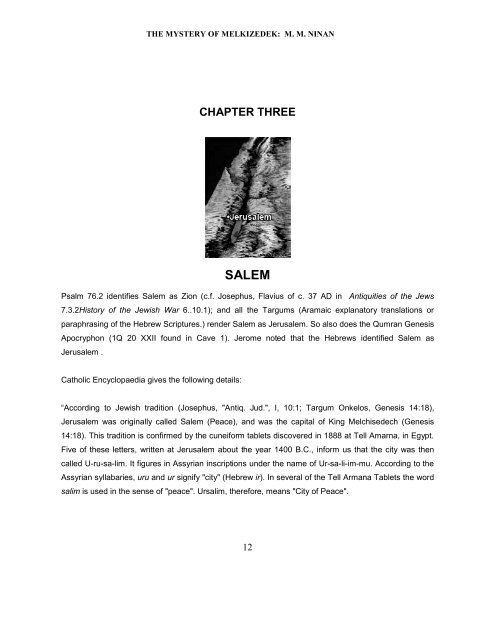Mystery of Melchzedek
Create successful ePaper yourself
Turn your PDF publications into a flip-book with our unique Google optimized e-Paper software.
THE MYSTERY OF MELKIZEDEK: M. M. NINAN<br />
CHAPTER THREE<br />
SALEM<br />
Psalm 76.2 identifies Salem as Zion (c.f. Josephus, Flavius <strong>of</strong> c. 37 AD in Antiquities <strong>of</strong> the Jews<br />
7.3.2History <strong>of</strong> the Jewish War 6..10.1); and all the Targums (Aramaic explanatory translations or<br />
paraphrasing <strong>of</strong> the Hebrew Scriptures.) render Salem as Jerusalem. So also does the Qumran Genesis<br />
Apocryphon (1Q 20 XXII found in Cave 1). Jerome noted that the Hebrews identified Salem as<br />
Jerusalem .<br />
Catholic Encyclopaedia gives the following details:<br />
“According to Jewish tradition (Josephus, "Antiq. Jud.", I, 10:1; Targum Onkelos, Genesis 14:18),<br />
Jerusalem was originally called Salem (Peace), and was the capital <strong>of</strong> King Melchisedech (Genesis<br />
14:18). This tradition is confirmed by the cuneiform tablets discovered in 1888 at Tell Amarna, in Egypt.<br />
Five <strong>of</strong> these letters, written at Jerusalem about the year 1400 B.C., inform us that the city was then<br />
called U-ru-sa-lim. It figures in Assyrian inscriptions under the name <strong>of</strong> Ur-sa-li-im-mu. According to the<br />
Assyrian syllabaries, uru and ur signify "city" (Hebrew ir). In several <strong>of</strong> the Tell Armana Tablets the word<br />
salim is used in the sense <strong>of</strong> "peace". Ursalim, therefore, means "City <strong>of</strong> Peace".<br />
12


















